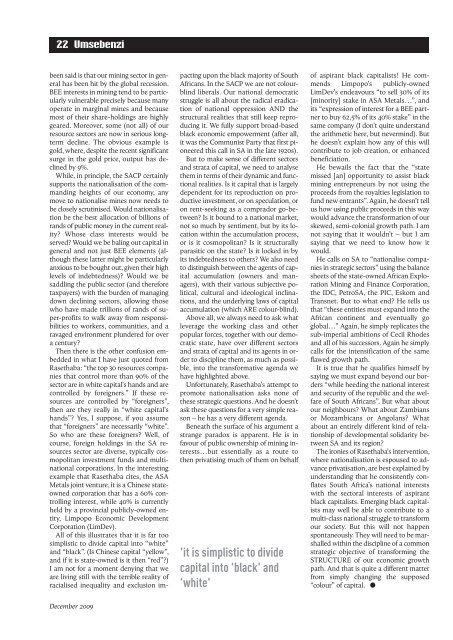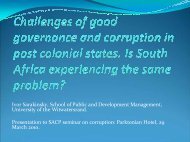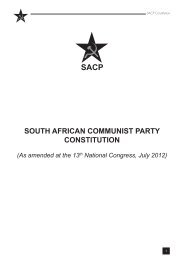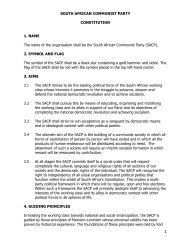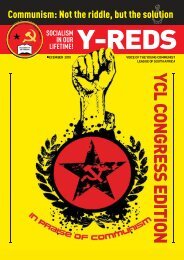Forward to Socialism!! - South African Communist Party
Forward to Socialism!! - South African Communist Party
Forward to Socialism!! - South African Communist Party
You also want an ePaper? Increase the reach of your titles
YUMPU automatically turns print PDFs into web optimized ePapers that Google loves.
22 Umsebenzi<br />
pacting upon the black majority of <strong>South</strong><br />
<strong>African</strong>s. In the SACP we are not colourblind<br />
liberals. Our national democratic<br />
struggle is all about the radical eradication<br />
of national oppression AND the<br />
structural realities that still keep reproducing<br />
it. We fully support broad-based<br />
black economic empowerment (after all,<br />
it was the <strong>Communist</strong> <strong>Party</strong> that first pioneered<br />
this call in SA in the late 1920s).<br />
But <strong>to</strong> make sense of different sec<strong>to</strong>rs<br />
and strata of capital, we need <strong>to</strong> analyse<br />
them in terms of their dynamic and functional<br />
realities. Is it capital that is largely<br />
dependent for its reproduction on productive<br />
investment, or on speculation, or<br />
on rent-seeking as a comprador go-between?<br />
Is it bound <strong>to</strong> a national market,<br />
not so much by sentiment, but by its location<br />
within the accumulation process,<br />
or is it cosmopolitan? Is it structurally<br />
parasitic on the state? Is it locked in by<br />
its indebtedness <strong>to</strong> others? We also need<br />
<strong>to</strong> distinguish between the agents of capital<br />
accumulation (owners and managers),<br />
with their various subjective political,<br />
cultural and ideological inclinations,<br />
and the underlying laws of capital<br />
accumulation (which ARE colour-blind).<br />
Above all, we always need <strong>to</strong> ask what<br />
leverage the working class and other<br />
popular forces, <strong>to</strong>gether with our democratic<br />
state, have over different sec<strong>to</strong>rs<br />
and strata of capital and its agents in order<br />
<strong>to</strong> discipline them, as much as possible,<br />
in<strong>to</strong> the transformative agenda we<br />
have highlighted above.<br />
Unfortunately, Rasethaba’s attempt <strong>to</strong><br />
promote nationalisation asks none of<br />
these strategic questions. And he doesn’t<br />
ask these questions for a very simple reason<br />
– he has a very different agenda.<br />
Beneath the surface of his argument a<br />
strange paradox is apparent. He is in<br />
favour of public ownership of mining interests…but<br />
essentially as a route <strong>to</strong><br />
then privatising much of them on behalf<br />
'it is simplistic <strong>to</strong> divide<br />
capital in<strong>to</strong> 'black' and<br />
'white'<br />
been said is that our mining sec<strong>to</strong>r in general<br />
has been hit by the global recession.<br />
BEE interests in mining tend <strong>to</strong> be particularly<br />
vulnerable precisely because many<br />
operate in marginal mines and because<br />
most of their share-holdings are highly<br />
geared. Moreover, some (not all) of our<br />
resource sec<strong>to</strong>rs are now in serious longterm<br />
decline. The obvious example is<br />
gold, where, despite the recent significant<br />
surge in the gold price, output has declined<br />
by 9%.<br />
While, in principle, the SACP certainly<br />
supports the nationalisation of the commanding<br />
heights of our economy, any<br />
move <strong>to</strong> nationalise mines now needs <strong>to</strong><br />
be closely scrutinised. Would nationalisation<br />
be the best allocation of billions of<br />
rands of public money in the current reality?<br />
Whose class interests would be<br />
served? Would we be baling out capital in<br />
general and not just BEE elements (although<br />
these latter might be particularly<br />
anxious <strong>to</strong> be bought out, given their high<br />
levels of indebtedness)? Would we be<br />
saddling the public sec<strong>to</strong>r (and therefore<br />
taxpayers) with the burden of managing<br />
down declining sec<strong>to</strong>rs, allowing those<br />
who have made trillions of rands of super-profits<br />
<strong>to</strong> walk away from responsibilities<br />
<strong>to</strong> workers, communities, and a<br />
ravaged environment plundered for over<br />
a century?<br />
Then there is the other confusion embedded<br />
in what I have just quoted from<br />
Rasethaba: “the <strong>to</strong>p 30 resources companies<br />
that control more than 90% of the<br />
sec<strong>to</strong>r are in white capital’s hands and are<br />
controlled by foreigners.” If these resources<br />
are controlled by “foreigners”,<br />
then are they really in “white capital’s<br />
hands”? Yes, I suppose, if you assume<br />
that “foreigners” are necessarily “white”.<br />
So who are these foreigners? Well, of<br />
course, foreign holdings in the SA resources<br />
sec<strong>to</strong>r are diverse, typically cosmopolitan<br />
investment funds and multinational<br />
corporations. In the interesting<br />
example that Rasethaba cites, the ASA<br />
Metals joint venture, it is a Chinese stateowned<br />
corporation that has a 60% controlling<br />
interest, while 40% is currently<br />
held by a provincial publicly-owned entity,<br />
Limpopo Economic Development<br />
Corporation (LimDev).<br />
All of this illustrates that it is far <strong>to</strong>o<br />
simplistic <strong>to</strong> divide capital in<strong>to</strong> “white”<br />
and “black”. (Is Chinese capital “yellow”,<br />
and if it is state-owned is it then “red”?)<br />
I am not for a moment denying that we<br />
are living still with the terrible reality of<br />
racialised inequality and exclusion imof<br />
aspirant black capitalists! He commends<br />
Limpopo’s publicly-owned<br />
LimDev’s endeavours “<strong>to</strong> sell 30% of its<br />
[minority] stake in ASA Metals…”, and<br />
its “expression of interest for a BEE partner<br />
<strong>to</strong> buy 62,5% of its 40% stake” in the<br />
same company (I don’t quite understand<br />
the arithmetic here, but nevermind). But<br />
he doesn’t explain how any of this will<br />
contribute <strong>to</strong> job creation, or enhanced<br />
beneficiation.<br />
He bewails the fact that the “state<br />
missed [an] opportunity <strong>to</strong> assist black<br />
mining entrepreneurs by not using the<br />
proceeds from the royalties legislation <strong>to</strong><br />
fund new entrants”. Again, he doesn’t tell<br />
us how using public proceeds in this way<br />
would advance the transformation of our<br />
skewed, semi-colonial growth path. I am<br />
not saying that it wouldn’t – but I am<br />
saying that we need <strong>to</strong> know how it<br />
would.<br />
He calls on SA <strong>to</strong> “nationalise companies<br />
in strategic sec<strong>to</strong>rs” using the balance<br />
sheets of the state-owned <strong>African</strong> Exploration<br />
Mining and Finance Corporation,<br />
the IDC, PetroSA, the PIC, Eskom and<br />
Transnet. But <strong>to</strong> what end? He tells us<br />
that “these entities must expand in<strong>to</strong> the<br />
<strong>African</strong> continent and eventually go<br />
global…” Again, he simply replicates the<br />
sub-imperial ambitions of Cecil Rhodes<br />
and all of his successors. Again he simply<br />
calls for the intensification of the same<br />
flawed growth path.<br />
It is true that he qualifies himself by<br />
saying we must expand beyond our borders<br />
“while heeding the national interest<br />
and security of the republic and the welfare<br />
of <strong>South</strong> <strong>African</strong>s”. But what about<br />
our neighbours? What about Zambians<br />
or Mozambicans or Angolans? What<br />
about an entirely different kind of relationship<br />
of developmental solidarity between<br />
SA and its region?<br />
The ironies of Rasethaba’s intervention,<br />
where nationalisation is espoused <strong>to</strong> advance<br />
privatisation, are best explained by<br />
understanding that he consistently conflates<br />
<strong>South</strong> Africa’s national interests<br />
with the sec<strong>to</strong>ral interests of aspirant<br />
black capitalists. Emerging black capitalists<br />
may well be able <strong>to</strong> contribute <strong>to</strong> a<br />
multi-class national struggle <strong>to</strong> transform<br />
our society. But this will not happen<br />
spontaneously. They will need <strong>to</strong> be marshalled<br />
within the discipline of a common<br />
strategic objective of transforming the<br />
STRUCTURE of our economic growth<br />
path. And that is quite a different matter<br />
from simply changing the supposed<br />
“colour” of capital.<br />
December 2009


